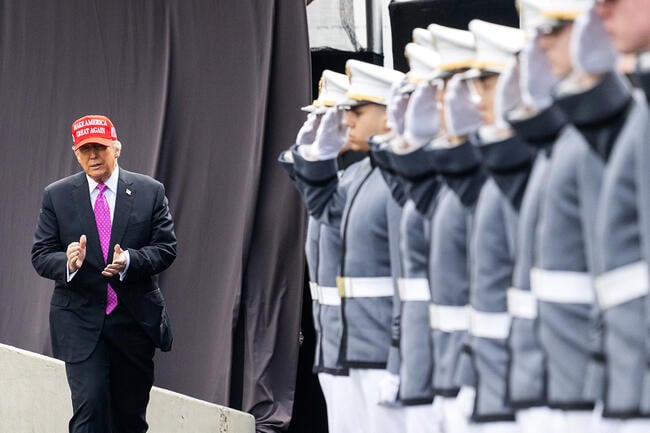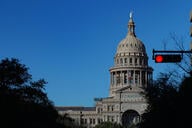You have /5 articles left.
Sign up for a free account or log in.

The U.S. Military Academy at West Point is subject to Defense Department orders.
Saul Loeb/AFP/Getty Images
Ever since Harvard and Columbia Universities refused to accede immediately to all of the Trump administration’s demands to change their policies, federal officials have cut off billions of dollars in funding and deployed other heavy-handed approaches to extract compliance.
But when the administration wanted to alter policies at the U.S. service academies, it simply commanded the changes.
A week into his second presidential term, Donald Trump issued an executive order banning service academies under the Defense Department—the U.S Military Academy at West Point, the U.S. Naval Academy and the U.S. Air Force Academy—from “promoting, advancing, or otherwise inculcating the following un-American, divisive, discriminatory, radical, extremist, and irrational theories.” The theories listed were “divisive concepts,” “gender ideology,” race or sex “stereotyping” and “scapegoating,” and the idea “that America’s founding documents are racist or sexist.”
Two days later, Defense Secretary Pete Hegseth followed up with another order commanding the service academies to “teach that America and its founding documents remain the most powerful force for good in human history.” In addition, he banned instruction on critical race theory and diversity, equity and inclusion.
The orders were a reminder of how differently service academies operate compared to civilian institutions—and an early example of how the Trump administration could win its war against what it dubs DEI faster at these academies than at private or public state universities. Faculty at West Point and the Naval Academy have raised concerns about academic freedom; a few members have already publicly announced their resignations.
‘Destroys the Constitution’
In February, West Point issued a policy requiring faculty, “while on duty or when using any USMA affiliation or branding,” to get department head approval for any “engagements” with external audiences concerning their own academic disciplines. These include—but aren’t limited to—journal articles, conference presentations, media interviews, op-eds and social media posts, the academy said.
It’s unclear how novel this requirement is. A 2019 Defense Department regulation says faculty must “submit materials for prepublication review if they are intended for public release or will be made available in public libraries.” Regardless, Graham Parsons, a West Point philosophy professor, raised alarm about the policy in a New York Times op-ed last month—an essay he said he didn’t get approval for. Parsons also wrote that the academy had pressured him to withdraw an already-accepted article on the “military’s obligation to be politically neutral.”
Parsons wrote that West Point has nixed its sociology major, a Black history project at the history department and three courses: Power and Difference, Topics in Gender History, and Race, Ethnicity, Nation. (West Point spokesperson Col. Terry Kelley told Inside Higher Ed that only two of these courses were canceled and the third is a special topics course that just isn’t offered every semester.) Department leaders additionally demanded that faculty remove from courses writings by James Baldwin and other Black authors, Parsons wrote.
“One of my supervisors ordered professors to get rid of readings on white supremacy in Western ethical theory and feminist approaches to ethics in Philosophy and Ethical Reasoning, a course I direct that is required for all cadets,” he wrote. “A West Point student debate team was even told that it couldn’t take certain positions at a forthcoming competition.”
He announced he was resigning his tenured position after 13 years, saying, “I am ashamed to be associated with the academy in its current form.” Hegseth reposted Parsons’s op-ed on X, saying, “You will not be missed.”
The Times also reported that Christopher Barth, West Point’s senior librarian, is resigning after 14 years amid demands that he identify books that might violate Hegseth’s order. West Point didn’t answer most questions that Inside Higher Ed posed to it, including whether books have actually been removed.
At the Naval Academy, Tom McCarthy resigned from his role as history department chair this month, The Baltimore Sun reported. The Naval Academy confirmed his resignation letter to Inside Higher Ed.
McCarthy wrote that he was resigning because the academy’s superintendent, Vice Adm. Yvette Davids, ordered the department to reject a paper it had already accepted for a naval history symposium hosted by the academy. McCarthy’s letter didn’t say what the paper was about, and an academy spokesperson told Inside Higher Ed that “we do not release the details of papers not accepted to present at the McMullen Symposium.”
“For fifty years, the History Department has executed a trust on behalf of the international community of naval and maritime historians: to select papers for the biennial symposium solely on the basis of scholarly merit,” McCarthy wrote in his resignation. “This decision forces us to violate that trust. As a second option, I favored cancelling the conference altogether rather than cancelling a paper.”
The Naval Academy also temporarily removed 381 books from its shelves, the Associated Press reported, including Ibram X. Kendi’s How to Be an Antiracist, Emmanuel Acho’s Uncomfortable Conversations With a Black Man, Maia Kobabe’s Gender Queer, Janet Jacobs’s Memorializing the Holocaust and Maya Angelou’s I Know Why the Caged Bird Sings. The academy has since put most of the books back but didn’t explain to Inside Higher Ed which titles haven’t returned and why.
“Academic freedom plays a vital role in fulfilling the Naval Academy’s mission of educating and developing critical thinkers and leaders of character for our Navy and Marine Corps,” an academy spokesperson told Inside Higher Ed in an email.
Less news has emerged from the Air Force Academy, but Colorado media outlets have reported that the academy’s superintendent, Lt. Gen. Tony D. Bauernfeind, has proposed cutting 105 civilian faculty positions to reduce their share of the faculty from 37 percent to 20 percent. An internal communication said such a reduction would mean losing majors, local media reported.
“In response to civilian workforce shaping across the entire Department of Defense, the U.S. Air Force Academy is conducting prudent planning to identify our requirements, personnel, processes, programs, and organizational structures to best execute our mission,” an academy spokesperson told Inside Higher Ed in a statement. “Our design efforts are a small piece of the larger transformation to right size the force and increase warfighter readiness and lethality.”
At West Point, two employees who didn’t wish to be named due to fear of retaliation told Inside Higher Ed that the academy is going further than the Trump administration has actually demanded. They said the academy’s administrators, who must be military service members, are aggressively interpreting the federal government’s orders to limit expression. (Kelley said all department heads are service members, though two of four vice deans are civilians.)
One employee told Inside Higher Ed that West Point is “trying to fire anybody who speaks up.”
“West Point has gone all out to try to stop speech,” the employee said. Pointing to the policy requiring preapproval for publications that mention a professor’s West Point affiliation, the employee said, “It’s not something that anybody from the Trump administration or the Department of Defense required. This was the decision of the administrators—military officers.”
“It’s unclear why any higher education institution would issue a policy that, in essence, destroys the Constitution,” the employee said. “But one might be able to see that by trying to control everybody else, they save their own jobs and protect themselves from criticism.”
The other West Point employee who wished to remain anonymous said, “We’ve always had academic freedom to a point—because we are command-driven and we have to consider what the policies of the Army are.”
But “this is the most change and disruption I have seen in the academic world here in all my time,” the employee said.
“Everyone has a suit on or a uniform on and says, ‘Yes, sir,’ or ‘Yes, ma’am,’” the employee said. West Point has disbanded student affinity groups and directed employees to scrub content that could be considered DEI-related from the social media accounts of other clubs, they added.
The employee said they’re retiring “because I can’t take this.”
Athens vs. Sparta
Chris Arney has seen a lot of West Point’s history. He graduated from the academy in 1971, served as a military officer faculty member from 1980 to 2001 and then as a civilian professor from 2009 to 2019, he said. Retired, he’s now an emeritus math professor.
Before the 1970s, Arney said, the academy had long focused on “a very physical-based military” that made sense for that time.
“Department heads were often the only Ph.D.s in the whole department,” he said.
Changes came in the last half century. Congress allowed women to enroll in the service academies, and the first group arrived at West Point in 1976. In the 1980s, many civilian faculty with doctorates entered West Point, Arney said.
“By the time the civilians were well established, academic freedom was fully embraced because the civilians brought it with them, in many cases,” Arney said. “And the administration and the faculty saw its value—saw it helped the academy to produce a new generation of leaders who were more academic, intellectual, more problem-solving, more creative.”
Arney also noted that there was relative peace in this era between the end of the Vietnam War and the Gulf War. But then, he said, both academic freedom and academic quality began to slip.
“Starting with the Gulf War, there was a little erosion” with each new military conflict, he said.
In 2007, long before Trump first took office, two U.S. Air Force Academy faculty members compared the co-existing—and competing—philosophies guiding the service academies to the two main combatants in the ancient Peloponnesian War.
“Every military academy houses both Sparta (those who focus on the ‘military’ in ‘military academy’) and Athens (those who focus on the ‘academy’ in ‘military academy’),” the faculty members wrote in an American Association of University Professors magazine.
“Discipline valorizes efficiency, hierarchy, obedience, standardization, parades, and risk avoidance,” they wrote. “Education values reflection and questioning, controversy and debate, the courage of independent thought, and the strength to embrace the unknown.”
During Trump’s first term in office, a current Air Force Academy faculty member and a former one listed multiple significant factors dampening the academic freedom of service academy faculty—especially those who are active-duty service members. Kelley, the West Point spokesperson, said 74 percent of the academy’s faculty are active duty.
“Whether through public pressure or explicit, systemic institutional policies that act as prior restraints, service academy faculty are confronted with public scrutiny and review of their scholarship prior to publication that can have a chilling effect on academic freedom,” the authors wrote in the University of North Carolina at Chapel Hill’s First Amendment Law Review, a student-edited legal journal.
“Indeed, for some service academy faculty, speech is constrained by the force of criminal law,” the authors wrote—referencing the Uniform Code of Military Justice’s prohibition against commissioned officers, including service member faculty, using “contemptuous words” when speaking about the president and other government officials. But, despite this and other limitations in that code and Defense Department policies, the authors defended the need for academic freedom in service academies.
“As future military officers and members of the government who will oversee and respond to diverse people and ideas, it is not in the Nation’s interest to limit the ideas to which the cadets are exposed,” they wrote, adding that faculty should be “free to engage their students in thought experiments, theses defense, and exposure to unconventional ideas, especially those ideas that challenge military orthodoxy.”
Now, in the second Trump administration, Sparta seems to be defeating Athens.
The anonymous West Point employee who is retiring said they’re concerned that the restrictions on teaching and curricula will mean sending cadets “out in the world unprepared to deal with reality.”
“The things that are going on to limit access to information and to limit what people can teach here are ultimately going to result in less prepared leaders for the Army,” the employee said. “As much as you want to say in some silly executive order that there are only two sexes,” officers will have to deal as leaders with troops who have doubts about their gender or sexuality, and troops who are of different races, they said.
The authors of the paper on Athens and Sparta wrote that a military “inductee may be trained to follow orders.” But a service academy student—one training to become an officer—“must be educated to discern among orders that may be legal or illegal, sensible or immoral.”
“Preparing officers to think critically, accurately, and independently requires a certain kind of reflective space—space to challenge the status quo, space to make honest mistakes, space to learn from one’s errors,” they wrote. “Academic freedom provides that space.”




